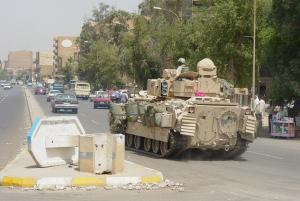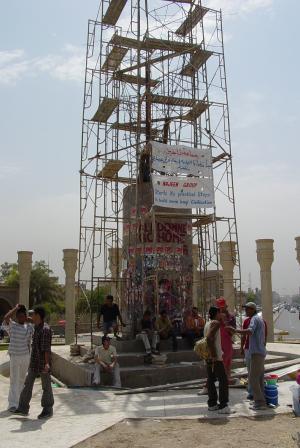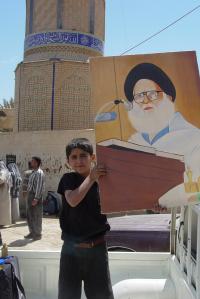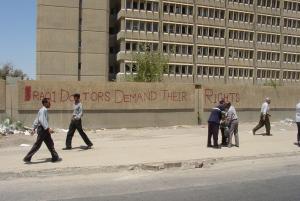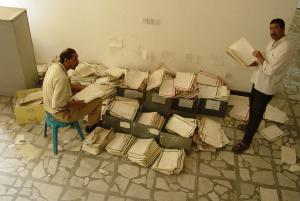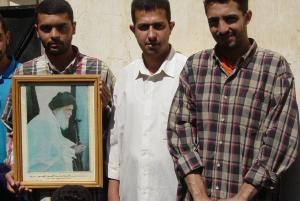Issue Date: June 20, 2003
Jeff Guntzel of Chicago and Mahasen Nasser-Eldin of East Jerusalem were in Iraq for NCR from April 30 to May 13. Their initial impressions appeared on NCRonline.org Those reports and a gallery of photos are still on NCR’s Web site in “Notes from Iraq” under the Special Sections heading. The following is a full report of their visit, during which Nasser-Eldin interpreted, in addition to writing and interviewing. By JEFF GUNTZEL Do not go to al-Sadr City,” warned Jasim, a former ranking employee at Saddam Hussein’s Ministry of Information. “It is not safe for you.” Others warned us too. Since the end of the bombing, none of them had been to the poor district of Baghdad, home to some 2 million Iraqi Shi’a. Until the fall of Baghdad, al-Sadr City had been known as Saddam City. The area has since taken the name of the revered Shi’a spiritual leader Grand Ayatollah Sayyid Mohammed Baqir al-Sadr, who was executed in 1980. Saddam Hussein likely ordered the assassination of the immensely influential ayatollah. Shi’a Muslims make up the majority in Iraq. Estimates vary but average around 60 percent of the population. If Iraq ever knows legitimate democracy, the Shi’a vote will carry enormous weight. Along with the Shi’a holy cities of Najaf and Karbala in southern Iraq, al-Sadr City is an essential component in the nexus of Shi’a power in Iraq. For the first time since the current borders of the Middle East were carved out by the Anglo-French Sykes-Picot Agreement in 1916, which put Iraq under British mandate (formally granted by the League of Nations in 1922), the Shi’a majority in Iraq are now facing the possibility of something more than the repressed subordinate. And so events in al-Sadr City are scrutinized for clues. How will the Shi’a react to an American and British occupation? Will there be retribution? An unfamiliar freedom still colors Friday prayers in al-Sadr City. So does a sort of order manifestly lacking in the rest of Baghdad. The clerics of the district had acted early on to fill the enormous power vacuum created by the collapse of nearly five decades of Ba’ath Party rule. Religious leaders pleaded for order days after anarchy and chaos swept Iraq’s capital. The response was instant, looters returned stolen goods, from lighting fixtures to garbage trucks and buses. Volunteers began directing traffic and guarding hospitals. Americans not needed The Americans were not widely accepted in al-Sadr City. The occupying troops apparently had underestimated the consequences of the fall of the government apparatus and the chaos that followed. The clerics and community members showed they were capable of organizing themselves to fill the power vacuum. In the end, the Americans were not needed. “If the clerics in Najaf say to rise up against the Americans, you will have 1 million armed Shi’a marching out of al-Sadr City within an hour,” Jasim promised. There is a sort of mythology that surrounds the residents of the district -- there always has been. Under Saddam Hussein, it was not uncommon to hear -- in hushed broadcasts from friends and colleagues -- of massacres and opposition in what was then called, cynically, Saddam City. An Iraqi friend was once jailed for taking two Western journalists on a driving tour of the district. We visited this key Muslim power center on a Friday to attend the Muslim services that under Saddam’s regime were prohibited in the mosques of Shi’a all over Iraq. Many of the district’s residents were just back from a historic march to the Shi’a holy cities of Najaf and Karbala in southern Iraq, a pilgrimage banned under the former regime. (An American soldier confessed to a friend that he thought the march of more than 100,000 impassioned Shi’a Muslims was “a protest against Easter.”)
Today a hand painted sign at the main entrance to the district, where Saddam’s picture once stood, reads, “WELCOME TO AL-SADR CITY.” Inside al-Sadr City, we were invited into the home of Abu Kazhem and his family. Like many other residents of the district, Abu Kazhem left the area with his family when the war began. They headed for Rus, a city 120 km to the north of Baghdad, where they stayed in a chicken coop for 10 days without access to electricity. For drinking water they used a nearby irrigation ditch. Now they are home again, and al-Sadr City is struggling to get back on its feet in the face of liberties unimaginable under the rule of Saddam Hussein. When Abu Kazhem remembers life in “Saddam City,” his eyes turn sorrowful. He blames Saddam and his regime for neglecting to invest in the development of the district. “Saddam plucked all competent teachers from al-Sadr City’s schools and appointed these teachers elsewhere, in schools where children of Ba’athists study. Our children received a very poor education and the administrations of schools in our area were corrupt. “The Mukhabarat [secret intelligence] and their collaborators were on every corner in our district, walking into homes and arresting people as they pleased.” He remembers with particular detail Feb. 18, 1980, when the community received news that something tragic had happened to Sayyid Muhammad Sadiq al-Sadr in Najaf. “Our community members headed towards al-Muhsim mosque to pray for our Sayyid’s recovery,” Abu Kazhem remembered. “We initially received news that he was attacked only to find out later in the day that he in fact was assassinated. We confronted the regime, and they opened fire on us in the mosque, spraying worshipers with bullets.” Like most Iraqis, Abu Kazhem and his family are relieved that the brutal days of Saddam Hussein are gone. Looking forward, Abu Kazhem proclaimed, “We are a people who want to live in peace with the world community.” But there was a warning too, present in many of our conversations here: “Iraq has seen a lot of rulers and invaders throughout its history. We are resilient. The American and British occupiers will leave Iraq, if not willingly, then by force.” But then there was a shift. “Do you have e-mail?” Abu Kazhem asked us with a wry smile, “Jay Garner promised us the Internet!” he said, referring to the retired U.S. Army general who was appointed in January by President Bush to serve as civil administrator of reconstruction of Iraq. In May Garner was replaced amid growing civil unrest. His successor is L. Paul Bremer, a former State Department counterterrorism official. Which is the real face of al-Sadr City, the place some said would be the heart of any organized resistance to the coalition forces occupying the country? At best, one might judge there are several faces. Contradictions Baghdad is full of contradictions. On one corner, scrawled in black paint on a stucco wall: “US ARMY GO HOME!” Around the corner, a middle-aged man sits casually on the back end of a tank, legs dangling, chatting with soldiers. At his feet, a young boy looks through U.S. Army-issue binoculars. “We will give the Americans a chance,” said one Iraqi friend, who did not wish to be named. Another said, “They have destroyed us.” For many there is at least a tentative acceptance of the occupation. This phenomenon must put nervous young soldiers at ease. And it must irk Iraqis for whom occupation means much more than the absence of Saddam Hussein’s tyrannical regime.
Down every street in Baghdad there is ample evidence that it is not just a regime that has been destroyed but also an enormous bureaucracy that ran a country of nearly 25 million people. Looters and arsonists destroyed public documents going back decades, centuries, and in some cases millennia. The records of cancer patients drift with the ash in the parking lot of the ransacked Ministry of Health. The Ministry of Trade is nothing but a charred shell. The Ministry of Education -- also destroyed. A notable exception, pointed out by every Iraqi we spoke with, is the Ministry of Oil, which still stands. Untouched, the sprawling complex has been protected by U.S. armored vehicles and razor wire since the Americans first entered the city. Behind it, a towering white Ministry of Agriculture building is burned black. Did this scenario present itself at the “what if” meetings in Washington? If so, what went wrong? Most nights at the sprawling Republican Palace in central Baghdad, officials of the U.S. Office of Reconstruction and Humanitarian Assistance, ORHA -- set up by the U.S. military to do just what its name suggests -- meet with organizations such as Save the Children UK, Doctors Without Borders and Christian Aid to share information. Representatives of the U.S. agency seem genuinely eager to help Iraq back to its feet, but the gap between what is needed -- desperately needed -- and what they can provide is troubling. The arrival of high-tension cables needed to restore power to Baghdad will take weeks, representatives of nongovernmental organizations are told at one meeting. There is a shortage of orange tape to mark off the unexploded ordnance that litters Baghdad’s residential areas. With the United Nations putting out a desperate call for chlorine to treat drinking water, ORHA representatives at this meeting do not know the status of the only chlorine plant in Iraq, located near Basra. When asked, it was apparent they don’t even know of its existence. At the end of a relatively uneventful meeting on security, a timid U.S. soldier asked to speak. “Today I met a woman who has a daughter dying of brain cancer. The woman was desperate and didn’t know where to turn. Are there any NGOs present that could help ease this woman’s suffering?” Silence. Next item. Rehana Kirthisinghalast, the Middle East director for the London-based NGO Christian Aid, was at that meeting. “Planning for civil society,” she explained afterwards, “is fundamentally different from military planning, though most businesses use the kind of strategic planning that has come from the military. “What I don’t see is the wholesale imposition of an American managerial structure. I think many people were anticipating that and were prepared to criticize it. And in the absence of [such a structure] what they are criticizing is an absence, but they’re not sure of what.” With the promise of liberation came the implicit promise of security, the absence of which is evident to even a casual, short-term observer of post-Saddam Iraq. Near the front entrance of the Petra Hotel, our home in Baghdad, sits a large pile of sandy brown bricks. For weeks the bricks had sealed the hotel shut in a wall that stretched the perimeter. Other hotel and shop owners had done the same thing to protect their businesses from bomb damage and looting. Inside the hotel lobby there is a welded steel gate, a second line of defense, blocking access to hundreds of rooms. Hotels advertise with painted banners: “Open for Business: All Services Available.” A few blocks away: “Everything Stolen … Hotel Closed.” Writing on the walls Post-Hussein Baghdad is covered in painted banners and graffiti. Outside the ransacked Ministry of Health, where employees of the ministry have been lining up to get a $20 stipend from the Americans, somebody had painted, “Iraqi Doctors Demand Their Rights.” Near a mosque, “Muslims Unite,” and “Yes … Yes… Islam!” And on a tree at an intersection, “Give us back our human rights.” Many of the banners are put up by the countless political parties looking to fill some of the void left by nearly fives decades of Ba’ath Party rule. A friend took a driving tour around Baghdad and counted 35 new parties. “All you need is five people and you have a party,” he told us, wide- eyed. “Now I hear some of them are asking for militias!” And then there are the familiar players. The Islamist Iraqi D’awa Party -- membership in the party under Saddam Hussein was illegal -- has set up shop in several abandoned buildings and has marked them with “IDP” in giant white block letters. The Patriotic Union of Kurdistan (PUK) and the Kurdistan Democratic Party (KDP) -- Iraq’s two Kurdish parties with a history bouncing between tentative cooperation and vicious competition -- have made their presence known.
And at Firdos Square, where U.S. Marines famously toppled a statue of Saddam Hussein, we passed by an Iraqi Communist Party May Day demonstration. Ahmed Chalabi, favored by many in Washington to lead Iraq through the next phase, hasn’t fared well on Baghdad’s walls. “Chalabi Go Home!” is not an unfamiliar sign. Most curious was a pronouncement painted in stiff letters on the garden wall of a modest estate: “THE LEADER OF THE TOWN.” Nobody is sure where all of this posturing will lead. Some worry that the opposing parties, even those who have been in existence for years, have no agenda. After many conversations we did not find anybody who proudly pronounces membership to any of these parties -- outside of rallies and party headquarters, of course. But many ask cynically if the chaos and insecurity they are experiencing is “the democracy the Americans promised.” The façade of base democracy is certainly evident here; but so, too, is the potential for a self-interested minority to wrest control from the chaos. And after 35 years of Saddam Hussein’s brutal rule, there has scarcely been 35 days without him. His presence can still be felt. The destruction of Saddam’s statues was more complete than the defacing of the hundreds, perhaps thousands, of portraits that mark almost every street corner. An eye peeks out from one; the famous moustache from another. But his presence can most palpably be felt in group discourse. We interviewed an accomplished Iraqi sculptor at a division of the Ministry of Education, where he worked before the war, developing extracurricular arts programs for kids. Sitting in the looted administrator’s office, a steady flow of employees, including the Ba’ath appointed director, wander in and out of the room, catching pieces of our conversation and sometimes jumping in. When talk shifts from art to politics, a vague rhetoric familiar to the days of the regime slips in. When asked to identify any of the many political parties that may offer some shred of hope for the future, the sculptor says, “Iraqis are strong and we love our country, with all the problems it has had in the past and the problems that may come in the future. I hope for a better Iraq. There is always hope in an artist.” We ask him if we could take him outside for a picture, and once outside he immediately throws off the yoke of caution, “I am sorry. I was not comfortable talking in there.” Trust was systematically destroyed under Saddam Hussein. “During the 35 years of his ruling,” Jasim, the former Ministry of Information employee explained, “there was no official organized party or association except the Ba’ath.” He continued, “If you raise a finger -- just a finger,” you are going to suffer. “You’re sacrificing your family and possibly your neighbors if you insult him.” Iraqis still often refer to Saddam simply as “him.” “You don’t know, maybe it is your brother who is going to submit a report against you; maybe your cousin. You can’t trust anybody. Even if you are alone in the toilet, you can’t say anything. Maybe your wife will hear it.” Tons of documents There is now documentary evidence to support such sad speculation. Files related to Iraq’s political prisoners are being collected at the former home of a close associate of Saddam Hussein. There, the Association of Free Iraqi Prisoners -- a newly formed organization of former political prisoners -- is logging and archiving literally tons of “liberated” documents related to the imprisonment and execution of Iraq’s political prisoners. There we saw decrees ordering the execution of one person or dozens. Some were signed by specially appointed “hanging judges.” Others were signed by Saddam Hussein himself. In the courtyard of the large estate, the names uncovered inside are posted for the relatives and loved ones of the disappeared who filter in, expressionless, all day. The political players favored by the occupier seem to operate somewhere above the fog from which most Iraqis are slowly emerging. Ahmed Chalabi’s Iraqi National Congress offices or Jalal Talibani’s Patriotic Union of Kurdistan’s headquarters in Baghdad are not teeming with citizens eager to volunteer or learn of the party program. When we asked a PUK spokesperson, three times, what the notorious Kurdish party was doing to reach out to Baghdad’s estimated 1 million Kurdish residents, nothing came, just answers to questions that were not asked. At the INC offices, a steady stream of black Mercedes sedans is escorted in or out by armed guards. Little other traffic can be seen. Political power in post-Saddam Iraq -- at least at this early stage -- comes from Washington, not the Iraqi street. In stark contrast stands the Iraqi Communist Party, whose exiled leaders spent most of the 1990s meeting every four months in Kurdish-controlled northern Iraq. Saddam Hussein outlawed the party -- which has deep roots in the country -- for a quarter of a century. Communist sympathizers in northern Iraq were targeted in Saddam Hussein’s “Anfal” campaign of the 1980s, largely understood as an ethnic cleansing campaign that included the notorious chemical weapons attacks on Kurdish villages. The Communist Party opened its new headquarters in Baghdad one week after the city’s fall. Unlike their counterparts more favored by the coalition, party offices (there is one in nearly every city in Iraq now) are alive with scores of ordinary Iraqis coming and going all day. They come for the party’s weekly paper, to learn about the party’s activities and to volunteer. Still, despite deep roots in Iraq and little evidence here of the taboo that attaches to communist parties of the West, the Iraqi Communist Party has not been invited by the Americans to join in the planning for a transitional authority. Now there are indications that the United States wants to put off any talk of a transitional government indefinitely. And the more powerful Iraqi opposition parties are hinting at a power grab.
We shared a ride out from Baghdad with a subtle and wise expatriate. He asked that we not use his name -- we will call him S. He was a professor at Baghdad University until 2000, when he left his job, his wife and two children to pursue a career abroad. His monthly salary at Baghdad University had slipped from $800 to $15 during the slow, cruel decade of economic sanctions. By the time he left, most of his fellow professors had already gone, the laboratories in his department -- he does not want me to be specific -- were rendered useless, and all of the textbooks were grossly out of date. The steadily growing student body was receiving a mere trace of the education once offered at the prestigious university. In early 2000, no longer willing to bear the “continuous grinding decline of standards of living,” S left for Europe. “Everyone was thinking that sanctions would not last long. That in one way or another the problem would be resolved and everyone would live as normal a life as possible.” But after what is known to Iraqis as the second Gulf War -- the first was the decade-long war with neighboring Iran -- S and millions of hopeful Iraqis like him found themselves standing at the edge of perpetual decline. “The [official] Iraqi claim was that since the Iraqi government was intact, then it was a victory. Although the Iraqi army was completely defeated -- it was a victory. And starting from this contradiction, an empty mountain was built.” Incongruous logic “To say publicly that one of [Saddam’s] actions was a mistake,” S continued, “was unimaginable.” But the contradictions were not unique to the incongruous logic of the Iraqi regime. “During that war,” S remembers, “the Western propaganda machine was asking Iraqis to start a revolution against the regime, to start an uprising. I still remember President Bush -- the father -- urging the Iraqis to take a stand.” Tens of thousands of war-weary Iraqis did exactly that. But the first Bush administration turned its back, standing silent as Saddam Hussein’s forces massacred countless thousands in the North and South. “Those mass graves that we are hearing about now were a direct consequence of Mr. Bush the father urging the Iraqis to rise against the regime and then turning his back. Why?” S built a successful business in Europe and saved money for his family back home struggling with the daily challenges of a country in the grips of the internal brutality of Saddam Hussein and the external strangulation of economic sanctions. And then there was the looming war. S watched the headlines carefully, his travel agent’s number at the ready. He would face any attack or invasion with his family in Iraq, not from the relative comfort and security of his home in exile. “It was not a very difficult decision to return,” S explained. “My life would not be a happy life if something were to happen to my family. “I arranged my return to be slightly before the war.” And he barely made it. One week after his return to the once affluent al-Mansur neighborhood of Baghdad, bombs struck a “target of opportunity” in the center of the city, signaling the commencement of “Operation Iraqi Freedom.” S spent that week reuniting with friends and family and buying up a reserve of food and water for his home. About three months worth, he said. “I was expecting a long war.” A storm of emotions and questions consumed S and his family. “They were expressing their fear, of course. And they were not sure about the outcome. I always had in the back of my mind that the first few days would be decisive. Would the Iraqi soldiers fight the Americans or join them? Everyone felt different.
“Most of the people did not want Saddam to continue. But then there was that question: Iraqis are proud people, would they allow their country to be occupied?” he asked. “Most of the people I have spoken to are keeping an open mind. They say let’s give them a chance. And in the back of their minds they have doubts. Whether those doubts will come true or not, only time will tell. Most of the people I have spoken to are happy [to be] rid of the previous regime. But they have their fears about the future.” For decades, S explains, “Americans have turned their backs on the Iraqis. Whether this experience will be better or worse, I don’t know. But it will be the last chance. Time is very short.” It is difficult to know if recent sporadic attacks -- some of them deadly -- against U.S. soldiers in Baghdad and elsewhere in Iraq signal an organized resistance or random acts of outrage. Whatever the case, S is not surprised: “Their reserve of food and money will finish soon. With time, weapons and no income, people cannot last long without doing something.” National Catholic Reporter, June 20, 2003 |
